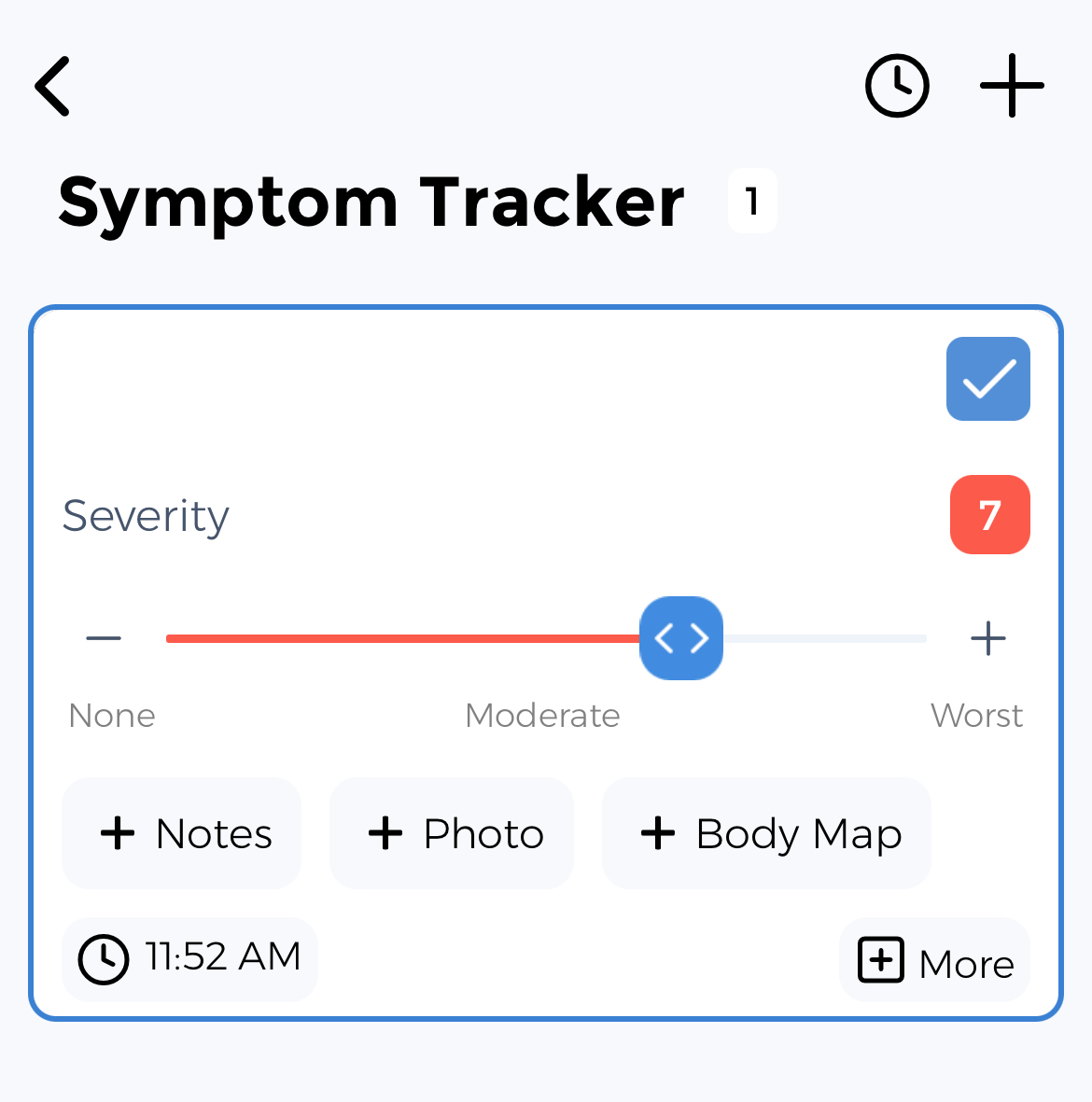Chronic Pelvic Pain Syndrome Symptom Tracker: Your Health Assistant
Living with Chronic Pelvic Pain Syndrome means dealing with pelvic pain, pain with urination, pain with bowel movements, and more. But here's the truth: Data is your most powerful tool. Every logged symptom reveals patterns—so you can take informed action.
Chronic pelvic pain syndrome involves persistent pain in the pelvic region lasting more than six months, often without an identifiable cause. Tracking symptoms helps identify triggers, monitor treatment effectiveness, and improve quality of life.
Key Chronic Pelvic Pain Syndrome Symptoms You Should Track
Struggling with symptoms like these? Tracking them reveals patterns, triggers, and how they impact your daily life.
Pelvic pain
Pain with urination
Pain with bowel movements
Pain with sexual activity
Lower back pain
Hip pain
Difficulty sitting
Urinary frequency
Urinary urgency
Fatigue
Track Your Chronic Pelvic Pain Syndrome Treatments
Tracking how these common treatments affect your symptoms can help you and your healthcare provider optimize your care plan:
Our tracker helps you monitor when you take medications and how they affect your symptoms over time.
Standardized Chronic Pelvic Pain Syndrome Assessments
Complete these evidence-based assessments in the App to measure your severity and monitor your progress:
⚡ Knowledge Is Your Superpower
The difference between feeling overwhelmed by Chronic Pelvic Pain Syndrome and feeling in control starts with data. When you track your symptoms, you transform uncertainty into clarity. Every data point brings you closer to understanding your unique patterns.
It's free to try for anyone—whether you're managing your own condition, supporting a child, helping an aging parent, or assisting a partner. Our tracker adapts to your specific role in the health journey.
How the CareClinic Chronic Pelvic Pain Syndrome Symptom Tracker Adapts to Your Needs
Adults
Caregivers
Parents of Children
Young Adults
Your Complete Chronic Pelvic Pain Syndrome Management Toolkit
Uncover Patterns & Insights
Map your Chronic Pelvic Pain Syndrome symptoms like a detective solving a case.
Understand Your Medication's Impact
Turn guesswork into strategy. See how treatments affect your well-being with clear health insights.
Objectively Measure Your Progress
Use clinically validated tools to objectively measure your progress.
Other Tools You May Like...
Plus 4 more specialized tracking tools available
Access All Tracking ToolsAlso Supports Other Conditions Like
Interstitial Cystitis Tracker
Interstitial Cystitis warriors use our tracker to monitor pelvic pain, pressure in bladder.
Endometriosis Tracker
Endometriosis warriors use our tracker to monitor pelvic pain, painful periods.
Irritable Bowel Syndrome Tracker
Irritable Bowel Syndrome warriors use our tracker to monitor abdominal pain, bloating.
Prostatitis Tracker
Prostatitis warriors use our tracker to monitor pain in the pelvis or lower back, burning sensation during urination.
Success Stories from Our Community
"As someone dealing with both Chronic Pelvic Pain Syndrome and Irritable Bowel Syndrome, this tracker was exactly what I needed. I can now take control instead of feeling helpless for both conditions."
"This app gave me insights about my Chronic Pelvic Pain Syndrome that even my specialist didn't catch. Tracking revealed my pain with bowel movements has a 3-day cycle, which completely changed my treatment approach."
Take Control of Your Chronic Pelvic Pain Syndrome Journey
Transform from feeling like a passive patient to becoming an informed self-advocate. Join thousands who've discovered new insights about their condition.
Designed by people who understand the daily challenges of managing chronic conditions, we're here to support you and your ❤️ ones.
Download Your Chronic Pelvic Pain Syndrome Tracker NowYour Data is Protected
Private & Secure
HIPAA Compliant
GDPR Compliant
Never Sell Data
Your data is yours: You get full control over who can view your information. CareClinic keeps all your data secure and encrypted.
References based on studies by:

